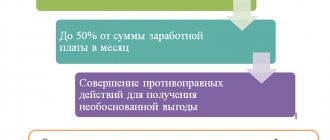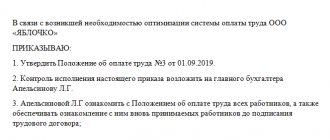general information
Standard working conditions are not typical for every type of profession and position.
To compensate for the inconvenience associated with significant deviations, officials have provided for certain types of compensation. The current version of the Labor Code guarantees that work in conditions deviating from normal conditions is subject to increased payment. The provisions of the Labor Code of the Russian Federation establish the minimum amounts of compensation additional payments. Employers have the right to increase the amount of bonuses for work with deviations from standard conditions. But employers do not have the right to reduce payments.
What conditions should not be considered normal:
- Harmful and dangerous industries.
- Special climatic locations (regions of the Far North and equivalent areas).
- Night shifts, hours.
- Recruitment to work overtime.
- Work on weekends and holidays.
- Combination of professions or positions.
- Perform duties of various qualifications.
- Development of new production facilities.
For each of the listed grounds, an individual remuneration procedure is provided. But in all cases, wages in case of deviation from normal conditions are assigned at an increased rate.
Legislation to protect workers' health
Legislative regulation of working conditions deviating from normal
The Constitution of the Russian Federation and Federal Law of the Russian Federation No. 323-FZ, other legislative documents and regulations protect the area of human health and human life from all kinds of safety violations at work. The approved health protection standards comply with federal laws.
Government bodies at the local level are vested with the right to issue municipal legal documents regarding health standards in accordance with Federal laws and regulatory legal acts of the Russian Federation.
Harmful and dangerous work
The minimum amount of additional payment for harmfulness or danger is 4% of the established tariff rate of the employee or his official salary. The percentage may be increased by the employer's decision.
The amount of compensation premiums for harmfulness should be determined taking into account the opinion of a representative body, for example a trade union. If the institution does not have one, then special standards must be outlined in the employment contract with the employee.
The harmfulness or danger of a particular production must be confirmed by an expert opinion. Previously, workplace certification acted as an expert opinion. It was replaced by a new type of examination - SOUT (special assessment of working conditions). If, according to the results of the assessment assessment, the place of work of a particular specialist is classified as harmful or dangerous, then it is necessary to establish a compensatory additional payment.
Example
The employee's salary is 30,000 rubles. Based on the results of the assessment and safety assessment, the workplace was classified as hazardous. According to the organization’s collective agreement, the additional payment for harmful activities is 10% of the official salary.
The amount of the compensation bonus: 30,000 × 10% = 3,000 rubles.
What is normal working conditions?
In order for workers to carry out the established volumes of work, employers are obliged to provide conditions that correspond to normal ones.
Attention! According to the provisions of Art. 163 of the Labor Code of the Russian Federation (hereinafter referred to as the Code), in order for them to be recognized as such, it is necessary:
- that machinery, equipment, technological equipment, premises and buildings are in good working order;
- workers must be provided with technical and other necessary documents on time;
- all materials, tools and other means required for the performance of labor duties must be of proper quality and issued to workers in a timely manner;
- compliance of working conditions with the standards of labor protection and safety of the production process.
Overtime work
An employee may be involved in the performance of his job duties beyond the standard regime. For example, the boss asked to stay after work to complete the preparation of the project. Then, for overtime hours, the employee is entitled to increased pay.
Article 152 of the Labor Code of the Russian Federation establishes the minimum values of compensatory additional payments. The employer has the right to increase bonuses. The employer must pay no less than 1.5 times the established wage for the first two hours worked overtime. For the rest of the time worked overtime, at least double pay is due.
Example
The employee is required to work overtime. His hourly rate is 400 rubles. The processing time was 4.5 hours. Let's calculate the surcharge:
- for the first two hours: 2 hours × 1.5 × 400 rubles = 1200 rubles;
- for the rest of the time: 2.5 hours × 2 × 400 rub. = 2000 rubles;
- total = 1200 + 2000 = 3200 rubles
IMPORTANT!
The provisions of the Labor Code of the Russian Federation provide for the right to replace an increased allowance with additional rest time. Payment is made as standard, and the employee has the right to additional time off.
It is necessary to decide whether an employee will use time off no later than the last day of the month in which he worked overtime. Do not forget to obtain a written application from the specialist for additional rest time.
Work of different qualifications
Payment for labor in case of deviation from the norm also occurs when an employee is forced to perform work of different qualifications. Such work is paid as follows:
- If the company has a time-based wage system, then the subordinate receives a salary for work with the highest qualifications.
- In the case of piecework earnings, the prices for all the work that he performs are taken into account.
If a subordinate with piecework pay performs the duties of an employee who has lower rates, the manager is obliged to compensate him for this difference.
Work of different qualifications can also include performing the duties of a temporarily absent employee, that is, combining positions. Payment for this depends on the volume, time period and other characteristics of specific job duties.
Weekends and holidays
Engaging an employee to work on a weekend or holiday also guarantees increased pay. Holidays are the same for all Russians; they are enshrined in Article 112 of the Labor Code of the Russian Federation. On weekends things are different.
An increased compensation bonus is due only for those days of work that, according to the employee’s work schedule, are considered days off and which are noted in Article 112 of the Labor Code of the Russian Federation as holidays. For the average specialist, a five-day week is Saturday and Sunday. For six-day workers - only Sunday. And for those who work in shifts, days off are determined according to the approved work schedule. If a citizen had to work on a day indicated in the schedule as a day off, then he must be paid for this time at an increased rate.
The minimum amount is established by Article 153 of the Labor Code of the Russian Federation: work on a weekend or holiday must be paid at least double the amount. The employer has the right to increase the amount of payment.
And the employee has the right to replace increased pay with additional rest time. For example, extend your vacation. To do this, you must submit a written application addressed to the manager with a request to provide time off for working on a weekend or holiday.
Example
In the billing month, the employee was recalled to work: once on a holiday, once on a day off. The daily tariff rate is 1000 rubles. For one holiday, the employee demanded time off:
- payment for a holiday: 1000 × 1 day × 1 size = 1000 rubles, since time off was received for this day;
- payment for a day off: 1000 × 1 day × 2 size = 2000 rubles, time off was not provided.
In total, the additional payment for weekends and holidays amounted to 3,000 rubles.
What can be considered a deviation from normal conditions?
In Art. 149 of the Code sets out the basic principles of remuneration for work if an employee fulfills his job duties and the working conditions do not correspond to normal ones.
According to the Labor Code of the Russian Federation, conditions that do not correspond to normal include:
- performing job duties that require different qualifications;
- if the worker combines professions (positions);
- work beyond the prescribed period;
- work at night;
- work on weekends and holidays, if they are recognized as non-working;
- carrying out work in other conditions that do not correspond to normal ones (for example, when working in new industries or with new products).
Such cases also include performing hard work, work duties in harmful, dangerous and other special conditions, work in areas with a harsh climate (Article 146 of the Code).
Labor legislation and relevant laws, collective agreements, internal company documents, labor agreements provide for an increased level of payments to persons who work in conditions different from normal ones, and their amount cannot be less than those provided for by laws governing labor relations.
Work at night
Night work is also subject to increased payment, according to Article 154 of the Labor Code of the Russian Federation. Remuneration for work in conditions deviating from normal conditions, in terms of night time, is also enshrined in Government Decree No. 554 of July 22, 2008. Night time is recognized as the period from 22:00 to 6:00 hours.
The amount of the bonus cannot be less than 20% of the official salary or tariff rate calculated for each hour of night work. Other types of allowances and wages received by the employee cannot be included in the calculation of extra pay for night shifts. Regulatory provisions need to be enshrined in the collective agreement, the employment contract with the employee, as well as in the local regulations on remuneration.
Example
Tariff rate - 200 rubles per hour. Worked 160 hours (standard), including 68 hours at night. Supplement for length of service - 10%. Supplement for night stays - 25%. Let's do the calculation:
- We calculate the salary: 160 × 200 = 32,000 rubles;
- bonus for length of service: 32,000 × 10% = 3,200 rubles;
- surcharge for overnight stays: 200 × 68 hours × 25% = 3400 rubles.
Total: 38,600 rubles (32,000 + 3200 + 3400).
The calculation of night rates does not include additional payment for length of service, since the calculation should be made solely based on the tariff rate or official salary.
Remuneration for labor in special conditions and in conditions deviating from normal
1. Remuneration for work of various qualifications
Conditions that deviate from normal include performing work of varying qualifications. According to Art. 150 of the Labor Code of the Russian Federation, when an employee performs work of various qualifications, his work must be paid for work of a higher qualification.
An employee’s work can be paid according to time-based (payment for time worked) and piece-rate (payment for products produced) remuneration systems. Thus, with time-based wages, work of varying qualifications must be paid at a higher tariff rate. If the organization uses piecework wages, then in the case of performing work of varying qualifications, the employer must pay the employee for the products produced at higher prices (prices for work of higher qualifications).
In some cases, piecework workers may be assigned to perform work that is charged lower than the qualification category assigned to such an employee. In this case, the employer must pay such an employee the inter-category difference, that is, the difference between the tariff rates for the employee’s qualification category and the category of work performed. If, on the contrary, the employee performs work that is charged higher than the grade assigned to him, then payment must be made at the higher grade.
2. Remuneration for combining professions
The Labor Code of the Russian Federation establishes special rules for remuneration when combining a profession and performing the duties of a temporarily absent employee. The combination of professions (positions) should be understood as the simultaneous performance by an employee of his main work under an employment contract and additional work in another profession (position). A special case of combining a profession (positions) is performing the duties of a temporarily absent employee.
Combining professions (positions) should not be confused with part-time work. If, when working part-time, payment is made in full in accordance with the concluded employment contract, then for combining professions the employee is paid additional payments, the amount of which is established by agreement between the employee and the employer. To date, the legislation has not established any minimum amounts of additional payments for combining professions or positions.
3. Remuneration for work outside normal working hours
Work outside normal working hours can be carried out both at the initiative of the employee (part-time work) and at the initiative of the employer (overtime).
Part-time work is paid in accordance with the concluded employment contract, either depending on the time worked, or on the actual products produced.
A different payment procedure is provided for overtime work. Overtime work is paid at an increased rate: for the first 2 hours at one and a half times the rate, and for subsequent hours at double rate.
Let us note that labor legislation establishes minimum wages for overtime work, which can be increased by a collective or labor agreement or a local act of the organization. In addition, overtime work can be compensated by providing additional rest time (not less than the time worked), but only with the consent of the employee.
4. Remuneration for work on weekends and non-working holidays
Performing work on weekends and non-working holidays in accordance with current legislation also applies to work in conditions deviating from normal ones. In accordance with Art. 153 of the Labor Code of the Russian Federation, work on a weekend or holiday is paid at least double the amount.
Employees whose work is paid according to a time system, work on a day off or a non-working holiday are paid at double hourly or daily rates. Piece workers must be paid for products produced on a weekend or holiday at no less than double piece rates.
For employees receiving a monthly salary, work on a day off or a non-working holiday is paid in the amount of no less than the daily or hourly rate in excess of the salary, and if the work was performed in excess of the monthly norm - no less than double the hourly or daily rate in addition to the salary.
Collective and labor agreements may provide for higher wages on holidays. If the work falls partly on a holiday, then you are paid at an increased (double) rate only for those hours that were included in the holiday (from 0 to 24 hours). At the request of the employee, increased pay for work on holidays can be compensated by providing another day of rest, but with payment at a single rate. In this case, the day off is not subject to payment.
Remuneration for work on weekends and non-working holidays of creative workers of the media, cinematography organizations, television and video crews, theaters, theatrical and concert organizations, circuses and other persons involved in the creation and (or) performance (exhibition) of works, in accordance with lists of jobs, professions, positions of these workers, approved by the Government of the Russian Federation, taking into account the opinion of the Russian Tripartite Commission for the Regulation of Social and Labor Relations, can be determined on the basis of a collective agreement, a local regulatory act, or an employment contract.
5. Remuneration for night work
Performing work in conditions deviating from normal conditions also includes working at night. Night work is considered to be from 22:00 pm to 6:00 am. Increased amounts of pay for night work are established by a collective agreement, but these amounts should not be lower than the amounts provided for by law. The minimum increase in wages for work at night is established by Decree of the Government of the Russian Federation of July 22, 2008 N 554 “On the minimum increase in wages for work at night.” In accordance with this document, the minimum increase in wages for work at night (from 10 p.m. to 6 a.m.) is 20 percent of the hourly tariff rate (salary (official salary) calculated per hour of work) for each hour of work at night.
6. Remuneration for non-compliance with labor standards
Special rules for remuneration are provided for failure to comply with labor standards. Remuneration for non-compliance with labor standards is made depending on the presence or absence of fault of the employee or employer.
Thus, if an employee fails to fulfill the standard of work established for him due to his fault, the work is paid in accordance with the work performed. If failure to fulfill labor standards or job duties occurred due to circumstances not related to the employee’s fault, he is guaranteed payment of at least two-thirds of the tariff rate, salary (official salary), calculated in proportion to the time actually worked, and due to the fault of the employer - in the amount of average earnings . The monthly salary cannot be lower than the minimum wage.
Payment for downtime is also made by the legislator depending on whose fault it was. Downtime caused by the employee is not subject to payment. Downtime through no fault of the employee is paid at least two-thirds of the tariff rate. If the downtime was due to the fault of the employer, then the employee retains not two-thirds of the tariff rate, but two-thirds of the average earnings, that is, taking into account various types of above-tariff payments. The employee must inform his immediate supervisor or another representative of the employer about the beginning of downtime caused by equipment breakdown and other reasons that make it impossible for the employee to continue to perform his job functions.
A special case of downtime is the suspension of work in connection with the suspension of activities or a temporary ban on activities due to violation of labor protection requirements through no fault of the employee. In this case, downtime is paid in the amount of average earnings (Article 220 of the Labor Code of the Russian Federation).
If creative workers of the media, cinematography organizations, television and video crews, theaters, theatrical and concert organizations, circuses and other persons involved in the creation and (or) performance (exhibition) of works, in accordance with the lists of works, professions, positions these workers, approved by the Government of the Russian Federation taking into account the opinion of the Russian Tripartite Commission for the Regulation of Social and Labor Relations, for any period of time do not participate in the creation and (or) performance (exhibition) of works or do not perform, then the specified time is not idle time and may be paid in the amount and manner established by the collective agreement, local regulations, or employment contract.
7. Payment for labor in the manufacture of products that turned out to be defective
Finally, special rules regulate remuneration for labor in the manufacture of products that turn out to be defective. Complete defects caused by the employee are not subject to payment. Moreover, in this case, the employee may be held financially liable for damage to materials in the amount of damage caused, but not in excess of his average monthly earnings (full financial liability can only occur in cases provided for by law). Partial defects due to the fault of the employee are paid at a reduced rate depending on the degree of suitability of the manufactured products. As with a complete marriage, in case of a partial marriage due to the fault of the employee, he bears financial responsibility for damage caused to the employer. The production of low-quality products through no fault of the employee is paid on an equal basis with good products.
Remuneration for work of various qualifications
Qualification is a set of professional skills, knowledge and level of training of a citizen in the field of performance of labor duties in a certain profession of an employee.
Performing work with different qualifications implies the following forms of remuneration:
- if payments are made on a time-based basis and work is performed that requires higher qualifications, it is paid in the amount provided for highly paid work;
- If the work is paid by the piece, the amount of payments is made depending on the job functions performed.
Important! If workers, whose work is paid by the piece due to the nature of the production process, need to perform work for which the payment is lower than that provided for by their grades, the employer is obligated to pay them the difference between grades.
If a combination of professions (positions) occurs, service areas are expanded, the volume of work increases, or a citizen performs the labor functions of an employee who is temporarily absent from the workplace, and is not released from the work duties specified in the employment agreement, additional payment is provided (Art. 151 of the Code).
Positions and professions are combined:
- within the boundaries of one employment agreement (this is the difference between part-time and internal part-time work);
- at the same time, the employee is not relieved of his main work responsibilities (the difference between part-time and temporary transfer).
The additional payment is made in the amount agreed upon by the employee and the employer, taking into account the content and (or) scope of additional duties (Article 60.2 of the Code).
Attention! Our qualified lawyers will assist you free of charge and around the clock on any issues. Find out more here.







